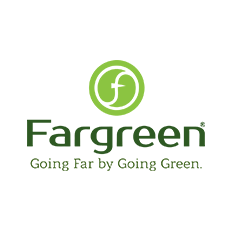Fargreen
Fargreen
Increasing the incomes of Vietnam’s small farmers through environmentally sustainable agriculture.
BCTA MEMBERSHIP STATUS
Active
SECTOR
Agriculture, Food & Beverage
HEADQUARTERS
Vietnam
REGION OF INITIATIVE
Asia & Pacific
SDG CONTRIBUTION
RELATED NEWS
Fargreen, a social enterprise dedicated to building sustainable farming communities in Vietnam, has joined the Business Call to Action (BCtA) with a pledge to provide 1,000 smallholder rice farmers with environmentally sustainable livelihood opportunities and training – helping them to increase their annual incomes by 50 percent.
Vietnam is the second largest rice exporter in the world: every year, the country produces 40 million metric tons of rice, generating over 20 million metric tons of rice straw as a byproduct. Most farmers burn this straw, releasing more than one ton of toxic carbon dioxide and nitrogen monoxide in the environment for every ton of rice straw burned. Fargreen’s founder, Trang Tran, grew up seeing the detrimental effects of open rice straw burning on the environment and local farmers’ health. In 2015, she founded Fargreen based on the environmentally friendly closed-loop production technique, which benefits local farmers while eliminating waste. Fargreen’s inclusive business model involves buying rice straw from local farmers (to stop them from being burned), and involving the farmers in the process of growing high-quality edible mushrooms using rice straw as the only substrate. After the mushrooms are harvested, they are shipped to Fargreen’s processing and packaging center and then delivered to customers under the Fargreen brand.
The inclusive and sustainable closed-loop production process not only prevents the release of greenhouse gasses, but generates no waste. Once rice farmers harvest the mushrooms, the straw used in the process decomposes into mulch. This mulch can be returned by farmers to their fields as a nutrient-rich biofertilizer for rice and vegetable crops, closing the production loop.
Smallholder farmers represent the most critical link in Fargreen’s value chain: the company outsources the production of its mushrooms to rice farmers earning less than US$3 per day. These farmers produce rice twice a year and earn income only when they sell the rice. In between the two growing seasons, many farmers migrate to cities in search of additional income. Fargreen is helping to stabilize their lives: since mushroom production happens year-round and supports rice cultivation, farmers now have a chance to earn income consistently throughout the year and no longer need to migrate. Through its support in using rice straw to cultivate mushrooms, the company aims to assist 1,000 small farmers in abandoning harmful practice of straw burning – preventing more than 4,000 tons of greenhouse gases from being released into the environment. The biofertilizer created through this process also reduces farmers’ dependence on costly chemical fertilizers.
By 2020, Fargreen will encourage at least 50 per cent of its farmers to replace their current use of chemical fertilizer with the biofertilizer that results from mushroom production. In the spring of 2016, Fargreen launched the first ever premium-branded mushroom products in the Vietnamese market under the Fargreen brand; they are now sought after in upscale urban markets with Naturally Vietnam as the first partner. With a consistent revenue stream, the company aims to break even in 2018 and reach profitability the following year.
By 2021, Fargreen plans to replicate its inclusive model in neighboring countries like Thailand, the Philippines and India, which are also impacted by the toxic open burning of rice straw. It will integrate farmers in those countries into its value chain.






